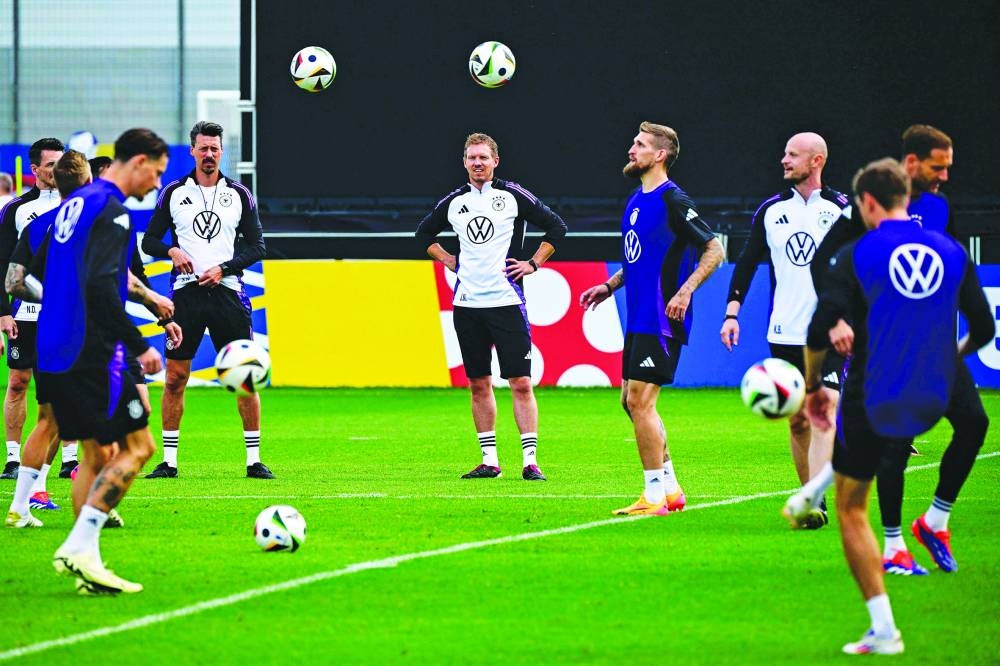Germany begin their quest for a first major title in a decade as the Euro 2024 hosts play their Group A opener against Scotland tomorrow to kick off the tournament and what the country hopes will be a month-long party for visiting fans.
Germany have won four World Cups and three European Championships but their stellar tournament reputation has been somewhat tarnished with a series of failures since their 2014 World Cup victory in Brazil. They went out of the next two World Cups in the group stage, their worst showing in over 80 years, and exited the last Euros in the round of 16.
With the tournament on home soil, there is only one outcome that will satisfy Germany’s fans, who are desperate for the success they once took for granted: winning the title. Despite their 2022 World Cup disappointment, a string of terrible results since, including a 4-1 home defeat to Japan back in September, and a change of coach a month later, the Germans still have their eyes on the big prize.
Coach Julian Nagelsmann, who took over in October 2023, made that clear only days before the tournament. “The normal ambition: we want to win it,” Nagelsmann said of the team’s goal. “It’s the same in all other tournaments. It’s probably not best for us to make this big claim that we’re going to become European champions. We will face up to the task. It is a huge task, it will be challenging, and it’s certainly not a chance that comes around very often.”
His team are banking on a mix of hugely talented young players, including Jamal Musiala and newly-crowned Bundesliga champion Florian Wirtz, and experienced veterans such as 2014 World Cup winners Manuel Neuer, Thomas Mueller and Toni Kroos.
The big question remains their goal-scoring ability with Kai Havertz, far from a natural number nine, being their first-choice striker. Burly forward Niclas Fuellkrug will be on the bench. They will need to underline those big ambitions against the Scots, who are playing in back-to-back European Championships for the first time since 1996.
Scotland, clear underdogs, are hoping for an early upset that could help guide them through the group stage for the first time in 11 international tournaments.
Meanwhile, Germany called up Emre Can to replace Aleksandar Pavlovic for the tournament, who misses out through tonsillitis, the DFB confirmed. Can, who captained Borussia Dortmund in their Champions League loss to Real Madrid in June, made his Germany debut in 2015 but had not played for his country since September 2023.
The former Liverpool and Juventus midfielder has played 43 times for Germany, scoring one goal. This marks the first time Nagelsmann has called the Dortmund player into the squad, with Can’s last nomination taking place under previous manager Hansi Flick.
“We wanted another defensive midfielder in the squad,” Nagelsmann said in a statement, saying Can had “immediately expressed his enthusiasm and willingness” to join the team. “We wanted to have another player in the squad who has played a lot of games, who knows how to deal with the pressure. (Can) can fulfil the profile that we can use now.”
Pavlovic, 20, played in Germany’s 0-0 draw with Ukraine but missed Friday’s 2-1 win over Greece. Born in Munich, the Bayern youth product made his Bundesliga debut in October and was also eligible to play for Serbia. He was a surprise call-up, brought into the side at the expense of experienced club teammate Leon Goretzka.
Nagelsmann decided to call up Can rather than recall Goretzka, who has scored 14 goals in 57 Germany games.
Apart from success on the pitch, the host country is also banking on a wave of enthusiasm from their own fans as well as an estimated 2.7 million visitors for the June 14-July 14 event. Large fan zones have been set up across all major cities, including Berlin’s massive fan space, stretching from the iconic Brandenburg gate far into the west of the city. The fan zones were an overwhelming success during the 2006 World Cup in Germany, helping to fuel the party atmosphere of that tournament, dubbed locally the ‘summer fairytale’.
Conditions are not quite the same this time, with more than one in four Germans having no interest in the Euros, and security being top of the agenda. Thousands of police will be deployed around the clock in an attempt to head off potential threats from terrorists, hooligans, violent individuals and cyberattacks.
“It is a major effort when it comes to the deployed forces,” Interior Minister Nancy Faeser said. “Each day we have 22,000 police officers in action for the Euro.” German police have also been working with colleagues in other countries to identify potential threats and make sure the tournament becomes another summer hit for the country.
Sport
Hosts Germany eye title as fans get ready for Euro 2024 party
Germany has suffered a series of failures since their 2014 World Cup victory

Germany’s head coach Julian Nagelsmann (centre) watches as his players train, ahead of the Euro 2024 football Championships, in Herzogenaurach, Germany, on Wednesday. Germany kick off the tournament against Scotland tomorrow. (AFP)
